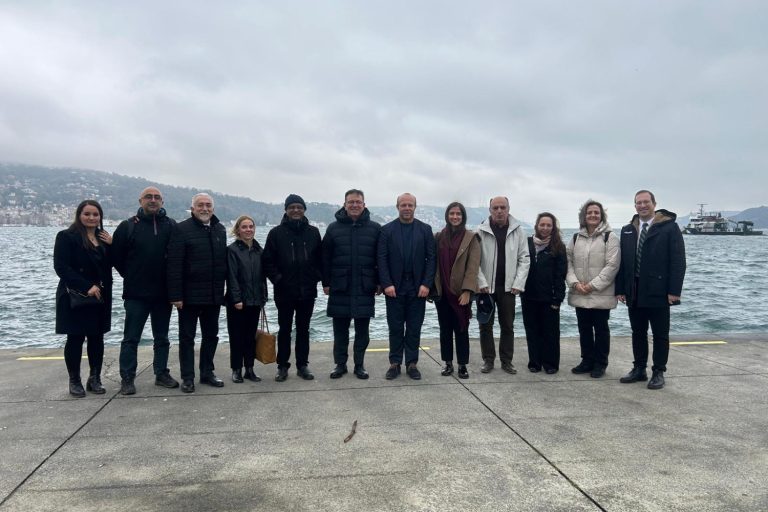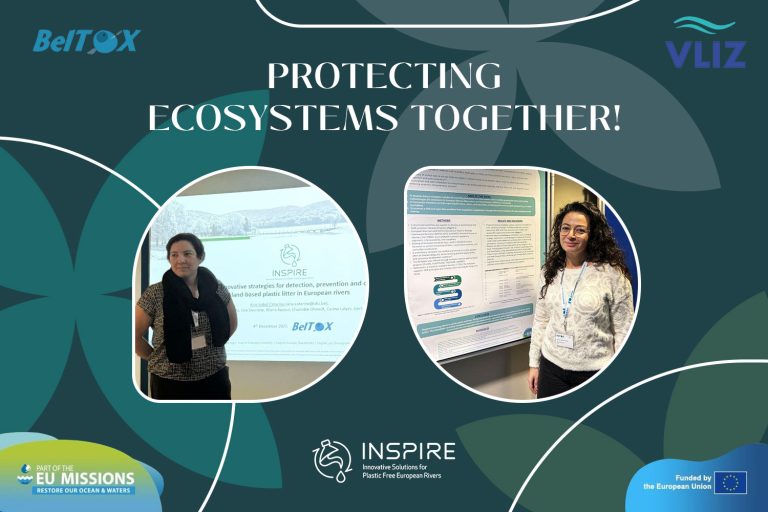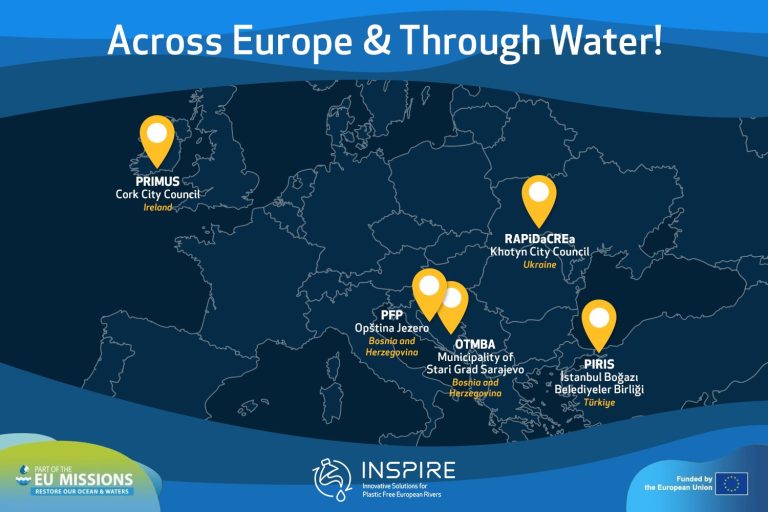The INSPIRE project conducted a series of site visits across Belgium from June 3rd to June 6th, 2024, involving partners from University of Maribor (Slovenia), Infordata (Italy), VLIZ (Belgium), VITO (Belgium), FishFlow (Netherlands), and EXIT (Serbia). These joint initiatives of multidisciplinary experts focused on exploring various innovative technologies implemented in the project to address the plastic pollution problem in aquatic environments (Belgium). This provided an excellent opportunity to increase the knowledge on the technical aspects and gain detailed insights for managing related monitoring and efficiency activities.
June 3rd: Ostend – Archimedean Drum Screw installation
The week started with a visit to VLIZ’s scientific harbour, Ostend, Belgium. In the morning, the team learned about plastic detection techniques like manta net and ferry box. They also visited VLIZ’s labs to observe how samples are collected, analysed, and plastic particles are quantified and characterised. In the afternoon, after thorough preparation, the Archimedean Drum Screw was deployed by project partner FishFlow (NL) at Slipwaykaai, marking a significant step in their tasks where this fish-friendly device will help catch plastic debris and other litter in the water.

(credits INSPIRE)
Installation of Archimedean Drum by FishFlow Screw in Ostend, Belgium
(credits INSPIRE)
Manta net monitoring microplastics, in Ostend, Belgium
June 4th: Antwerp – Patje Plastic site visit
On the second day, the team visited the Patje Plastic site in the Doeldok area of Antwerp, Belgium, an initiative of the SouPLess Life project. They observed significant pellet pollution and floating waste driven by wind in the northeast corner of Doeldok, an area-specific problem due to unwanted materials losses from plastics industries operating in the area. During the visit, the potential use of sensors and other environmental data acquisition devices was discussed (e.g. wind or weather) which could enhance monitoring capabilities and improve the understanding of the technology efficiency. The team also visited the operational services at the Port of Antwerp to study the types of litter collected using Patje Plastic. They received an explanation on the various steps involved in handling the debris collected through Patje Plastic, the maintenance of the machinery, and potential ideas for improvement.
In the afternoon, Infordata representatives met with the VLIZ data centre team (VMDC) to discuss data management, archiving FAIR data, and best practices for data flow within the INSPERE project.

(credits INSPIRE)
Virgin plastic pellets from nearby the industrial park in Doeldock, Antwerp, Belgium

(credits INSPIRE)
Patje Plastic device installed in the Doeldok area of Antwerp, Belgium

(credits VLIZ)
INSPIRE project partners at work in Antwerp port, Belgium

(credits INSPIRE)
Figure 6 – Litter collected by Patje Plastic
June 5th: Virtual meeting with VITO
The knowledge exchange activities continued during the middle of the week, as the INSPIRE experts met with VITO representatives to discuss technological and digitalisation issues. Specifically, the methodologies of data collection and analysis from the cameras installed on the bridges at the pilot sites were addressed, the protocols for managing the micro- and macro-plastic data were verified, and finally, the alpha version of the Inspire Impact Dashboard was presented, followed by a discussion on steps for optimisation.
June 6th: Temse – Stakeholder event and sampling activities
The final day was a well-attended stakeholder event in Temse, kindly hosted by the municipality, bringing together the INSPIRE consortium active partners in the Scheldt use case, with key representatives from VMM (Flanders Environment Agency), OVAM (The Public Flemish Waste Management Organisation), Vlaamse Waterweg (the Flemish Waterways Management Authority), Minaraad (Environment and Nature Council of Flanders), and the Municipality of Temse. Participants were introduced to the INSPIRE project and its objectives and partners involved in the Scheldt use case presented briefly their role in the project and contribution to the Scheldt Use Case. A lively discussion took place between stakeholders and INSPIRE project representatives, resulting in an excellent exchange of ideas and perspectives.
In the afternoon, the event featured field demonstrations of sampling activities around the Scheldt. Attendees participated in hands-on sessions with the JRC Floating Litter Monitoring App, learned about the quadrat methodology for mesoplastic sampling, and observed drone operations for riverside photo mapping. These drone operations are used for litter identification with AI, developed by the VITO partners.

(credits: INSPIRE)
Stakeholder event in Temse, Belgium

(credits INSPIRE)
Air drone by VITO equipped with 50 mm camera, Temse, Belgium

(credits: INSPIRE)
Plastic sampling and monitoring activities, Temse, Belgium

(credits INSPIRE)
Mesoplastic sampling with quadrat methodology, Temse, Belgium



